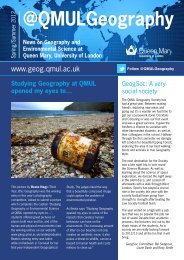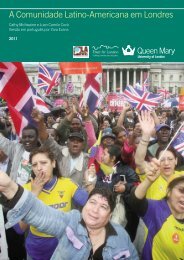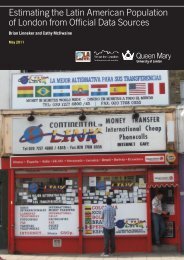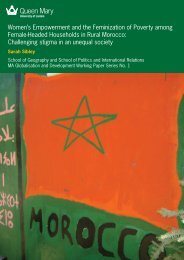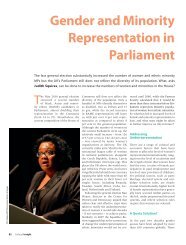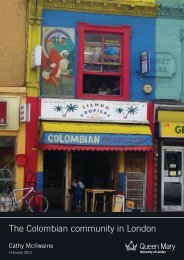Gender and Ethnic Identities among Low-paid Migrant Workers in ...
Gender and Ethnic Identities among Low-paid Migrant Workers in ...
Gender and Ethnic Identities among Low-paid Migrant Workers in ...
- No tags were found...
You also want an ePaper? Increase the reach of your titles
YUMPU automatically turns print PDFs into web optimized ePapers that Google loves.
(58%), with a quarter of those employed <strong>in</strong> office clean<strong>in</strong>g from Lat<strong>in</strong> America (26%), <strong>and</strong> just<br />
over a quarter of those employed <strong>in</strong> hotel <strong>and</strong> hospitality work from Eastern Europe (27%) (see<br />
Evans et al. 2005).<br />
Also important were the ways <strong>in</strong> which gender <strong>and</strong> ethnicity <strong>in</strong>tersected. Aga<strong>in</strong> draw<strong>in</strong>g on our<br />
survey, Black African men were concentrated <strong>in</strong> the ‘fem<strong>in</strong>ised’ clean<strong>in</strong>g <strong>and</strong> care sectors,<br />
compris<strong>in</strong>g 80% of all male workers clean<strong>in</strong>g on the London Underground, over half of all male<br />
care workers (57%) <strong>and</strong> just under half of all general cleaners (47%). There were concentrations of<br />
Non British White men <strong>in</strong> the hospitality sector (33%) <strong>and</strong> general clean<strong>in</strong>g (23%). Black African<br />
women were also, like their male ethnic counterparts, concentrated <strong>in</strong> clean<strong>in</strong>g on the Underground<br />
(76% of all female workers <strong>in</strong> this sector), <strong>and</strong> <strong>in</strong> the care sector (57% of all female workers <strong>in</strong> the<br />
sector), with nearly half of all women workers <strong>in</strong> hospitality be<strong>in</strong>g of Non British White orig<strong>in</strong><br />
(49%).<br />
What this data illustrates very broadly is the migrant, gender <strong>and</strong> ethnic segmentation of London’s<br />
labour market. Yet, while these broad patterns can be traced, far less is known about the<br />
experiences of low-<strong>paid</strong> migrant workers <strong>in</strong> London <strong>and</strong> <strong>in</strong> particular the gender<strong>in</strong>g of those<br />
experiences (for exceptions see Anderson 2001; Cox <strong>and</strong> Watt 2002). Thus we turn now to<br />
exam<strong>in</strong>e the nature of low-<strong>paid</strong> migrant identities across a range of labour market sectors focus<strong>in</strong>g<br />
specifically on how people make sense of their work.<br />
<strong>Low</strong>-<strong>paid</strong> migrant workers identities<br />
From a conceptual perspective, the ways <strong>in</strong> which migrants perceive themselves <strong>and</strong> are<br />
characterised by others (Vertovec 2001: 573), or <strong>in</strong> other words, their identities <strong>in</strong> any host country,<br />
are now acknowledged as multiple, fluid <strong>and</strong> dynamic (F<strong>in</strong>dlay et al. 2004). While identities are<br />
constructed through people’s <strong>in</strong>teraction <strong>in</strong> a range of different <strong>and</strong> overlapp<strong>in</strong>g doma<strong>in</strong>s, we want<br />
to focus here on migrant workers’ identities, <strong>and</strong> especially those associated with work. Despite the<br />
fact that migrants, both documented <strong>and</strong> undocumented, cont<strong>in</strong>ue to work <strong>in</strong> the ‘dirty, difficult <strong>and</strong><br />
dangerous’ jobs (IPPR 2006: 11) that no-one else wants, popular representations particularly <strong>in</strong> the<br />
media cont<strong>in</strong>ue to perpetuate the view that they are lazy, tak<strong>in</strong>g jobs from the native-born, <strong>and</strong><br />
unlawfully access<strong>in</strong>g benefits. As Hugo (2005: 22) notes: ‘There is a great deal of myth creation <strong>in</strong><br />
relation to migrants <strong>and</strong> migrant workers. They are frequently made scapegoats for all k<strong>in</strong>ds of<br />
problems be<strong>in</strong>g faced by host societies’.<br />
9




